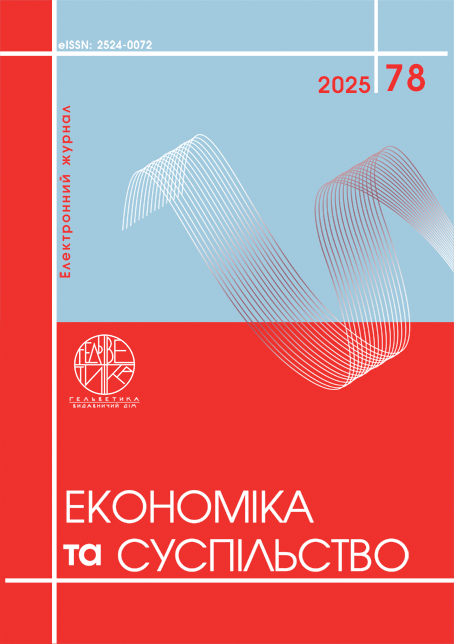OPTIMIZATION OF COMMUNICATION MANAGEMENT IN CRISIS CONDITIONS: THE ROLE OF TRAINING AND COACHING TECHNOLOGIES
Abstract
In the context of constant socio-economic, political and security challenges faced by Ukrainian business and the public sector, the issue of effective crisis communication management is of particular importance. The article considers approaches to optimizing communication management in crisis conditions through the implementation of training and coaching technologies. Against the backdrop of increased turbulence in the external environment, there is a growing need to build adaptive models of personnel management, where effective internal communication plays an important role. It has been determined that training programs contribute to increasing employees' awareness of crisis strategies, developing anti-crisis behavior skills and forming a unified communication field. In turn, coaching acts as a tool for the individual development of managers and key employees, focused on strengthening personal responsibility, increasing motivation and confidence in difficult conditions. Regular trainings increase employees' readiness to respond to force majeure situations and confidence in solving tasks in difficult information conditions. This is especially relevant for managers who must quickly assess risks, make decisions, and coordinate team actions. The paper systematizes typical communication problems in crisis situations (uncertainty, panic, information chain disruption, loss of trust) and analyzes the potential of modern training technologies (simulations, case studies, facilitation sessions) in overcoming them. It also examines the role of coaching in building trust between management and staff, preserving corporate culture, and ensuring stability in times of change. Training and coaching technologies in communication management increase the organization's adaptability, the quality of decision-making, and the effectiveness of overcoming crises. Their systematic implementation helps not only minimize losses, but also turn a crisis into a point of growth. The conclusion is made about the feasibility of systemic integration of training and coaching approaches into strategic communications management, which creates the prerequisites for organizational stability, support of team potential and readiness for new challenges in the future.
References
Sir John Whitmore. Culture at Work. 2023. URL: https://www.coachingcultureatwork.com/sir-john-whitmore/
Grant A. M. The Efficacy of Executive Coaching in Times of Organisational Change. Journal of Change Management. 2013. № 14(2), pp. 258-280
Downey M. Effective Modern Coaching: The Principles and Art of Successful Business Coaching. LID Publishing, 2014. 224 p.
Нежинська О. О., Тименко В. М. Коучингові технології як засіб підвищення якості вищої освіти. Management of higher education quality: problems and prospects: International scientific and practical conference (м. Київ, 29 вересня 2017 р.). London: LASHE, 2017. С. 101-102
Нежинська О. О., Тименко В. М. Коучинг у діяльності практичного психолога системи освіти: Спецкурс для слухачів очно-дистанційної форми навчання в системі післядипломної педагогічної освіти. Київ : Ун-т менедж. Освіти, 2015. 44 с.
Lancefield D., Cable D., Clark D. How technology is transforming executive coaching. HBR. 2019. URL: https://hbr.org/2019/11/how-technology-is-transforming-executivecoaching
Нежинська О. О., Тименко В. М. Основи коучингу: навчальний посібник. Київ; Харків : ТОВ «ДІСА ПЛЮС», 2017. 220 с.
Ніколаєв Л. О., Горбоконь І. В. Шляхи активізації ресурсів особистості засобами коучингу. Габітус. 2022. № 42. С. 193-196. https://doi.org/10.32782/2663-5208.2022.42.33
Lewin, K., Lippett, R. & White, R.K. (1939) Patterns of aggressive behaviour in experimentally created social climates. Journal of Social Psychology, 10, pp. 271-301.
7 Stage Model of Change. Ronald Lippitt 1958. URL: https://marcr.net/marcr-for-career-professionals/career-theory/career-theories-and-theorists/7-stage-model-of-change-ronald-lippitt/
W. Bennis, K. Benne e.a.: Strategieën voor verandering, Deventer, Van Loghum Slaterus, 1979.
Sir John Whitmore. (2023). Culture at Work. URL: https://www.coachingcultureatwork.com/sir-john-whitmore/
Grant A. M. (2013). The Efficacy of Executive Coaching in Times of Organisational Change. Journal of Change Management. № 14(2), pp. 258-280.
Downey M. (2014). Effective Modern Coaching: The Principles and Art of Successful Business Coaching. LID Publishing, 224 p.
Nezhynska O. O., Tymenko V. M. (2017). Kouchynhovi tekhnolohii yak zasib pidvyshchennia yakosti vyshchoi osvity. Management of higher education quality: problems and prospects: International scientific and practical conference (m. Kyiv, 29 veresnia 2017 r.). London: LASHE, S. 101-102
Nezhynska O. O., Tymenko V. M. (2015). Kouchynh u diialnosti praktychnoho psykholoha systemy osvity: Spetskurs dlia slukhachiv ochno-dystantsiinoi formy navchannia v systemi pisliadyplomnoi pedahohichnoi osvity. Kyiv: Un-t menedzh. Osvity, 44 s.
Lancefield D., Cable D., Clark D. (2019). How technology is transforming executive coaching. HBR. URL: https://hbr.org/2019/11/how-technology-is-transforming-executivecoaching
Nezhynska, O. O., Tymenko, V. M. (2017). Osnovy kouchynhu: navchalnyi posibnyk. Kyiv; Kharkiv: TOV «DISA PLIuS», 220 s.
Nikolaiev, L. O., Horbokon, I. V. (2022). Shliakhy aktyvizatsii resursiv osobystosti zasobamy kouchynhu. Habitus, 42, s. 193-196. https://doi.org/10.32782/2663-5208.2022.42.33
Lewin, K., Lippett, R. & White, R.K. (1939) Patterns of aggressive behaviour in experimentally created social climates. Journal of Social Psychology, 10, pp. 271-301.
7 Stage Model of Change. Ronald Lippitt (1958). URL: https://marcr.net/marcr-for-career-professionals/career-theory/career-theories-and-theorists/7-stage-model-of-change-ronald-lippitt/
W. Bennis, K. Benne e.a.: Strategieën voor verandering, Deventer, Van Loghum Slaterus, (1979).
Copyright (c) 2025 Наталя Іченська

This work is licensed under a Creative Commons Attribution 4.0 International License.


